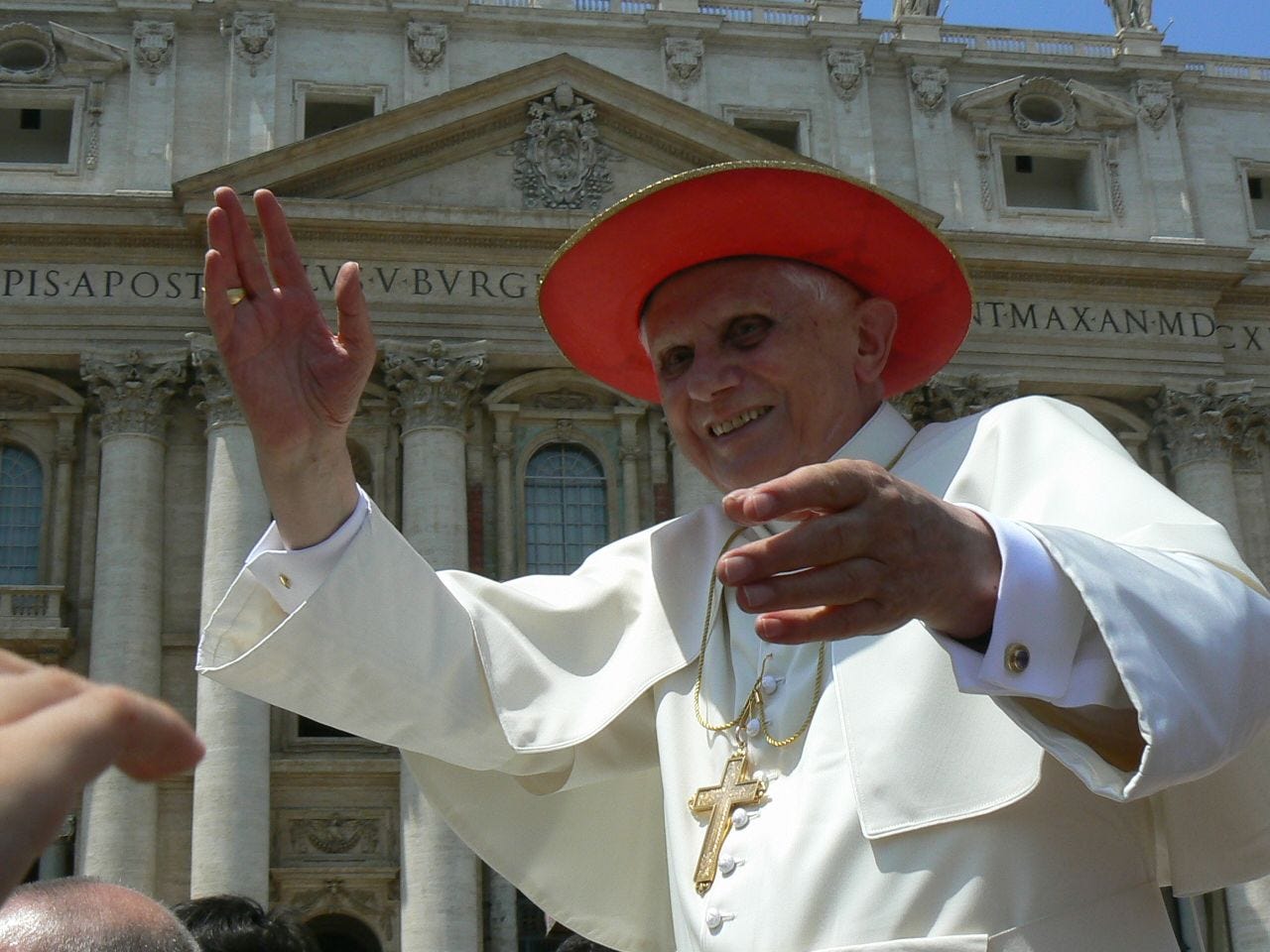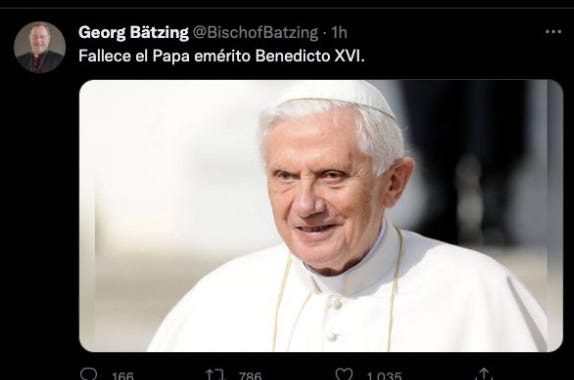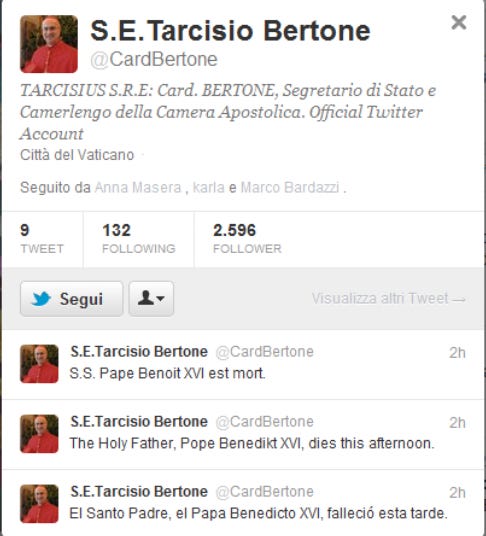Hey everybody,
You’re reading The Tuesday Pillar Post, and Pope emeritus Benedict XVI is still not dead.
Why is that news?
Because last night an Italian schoolteacher named Tommaso De Benedetti created a moral panic online, with a hoax that seems to have been in the works for nearly a year.
Back in August 2021, the guy created a Twitter account for Bishop Georg Bätzing, who is president of the German bishops’ conference. The account managed to amass thousands of followers. He didn’t use the account, but he built that following by strategically following the right people, and allowing the Twitter algorithms to do the rest.
Then yesterday evening, he tweeted in German, English, and Spanish that Pope emeritus Benedict XVI had died.
The tweets took off like wildfire. Several media outlets picked them up, and a lot of producers and journalists retweeted them. My phone started blowing up — priests, bishops, and other journalists were all asking me if it was true.
I called our team, and told them we had to get to work.
Now, here’s why I feel a little sheepish: I retweeted the Bätzing tweet, with a couched hedge saying that this was something Bätzing was apparently claiming and we were working to confirm it.
In my defense it was the end of a long day, but even with the inclusion of a hedge, you know, I try not to act rashly about stuff like that. So I didn’t say it was true, but, still, I’m sorry if I let you guys down or anything like that. We try to make it a point to keep our heads when others are losing theirs.
Anyway, within about one minute of my hedged retweet, it became clear that the story of Benedict’s death had begun with the tweet from “Bätzing,” and that the account was fake — it had no twitter history at all, and was not followed by any German ecclesiastics or news services. So I deleted my tweet, wrote instead that we were trying to confirm the rumor but I was skeptical. Within a couple of minutes and some phone calls to very sleepy friends in Rome, it became clear the whole thing was a hoax.
In fact, De Benedetti soon after tweeted from the “Bätzing” account that it was a hoax.
Why? Why would the guy set up a Twitter account 11 months ago just to start a rumor on a random Tuesday in July?
Well - that’s what De Benedetti likes doing. He’s done it before - the guy has set off several fake news wildfires, usually with fake accounts reporting the fake deaths of public figures.
In fact, guess what?
Back in 2012, the guy used a fake “Cardinal Bertone” account to tweet that Benedict XVI had died. That tweet didn’t create much buzz. A lot of people thought it was fake right away — in part because De Benedetti had created the Cardinal Bertone account just one day before his hoax.
But his m.o. was very much the same. Here’s an old screenshot I found:
In the intervening decade, I guess, De Benedetti has gotten better at creating fake papal deaths. It’s a weird hobby. I’m sure there were people who were really upset by what De Benedetti did — it was rude, an abuse of our freedom of speech, and inconsiderate.
I’m also sure there will be people who take things further, who say that hoaxes like that are dangerous, should be seriously prosecuted, etc. I think that’s probably a bit over the top — it was sophomoric, ill-mannered, and childish, but that’s about it.
At any rate, Pope emeritus Benedict XVI is, by all accounts, still not dead.
And that’s a good reminder to pray for the former pontiffI. He’s 95 years old, and he’s preparing for his inevitable death - as we all should. There is no escaping the last things- and that’s not fake news, I promise.
More real news
Before Russian troops crossed the border, Church leaders in Ukraine thought they were prepared for wartime pastoral ministry — until the brutality of the Russian invasion left the Ukrainian people suffering in ways that almost no one expected. The war means that everything in Ukraine is different, and the Church’s pastoral life has changed too.
So Ukrainian correspondent Anatolii Babynskyi talked with priests and others in pastoral ministry in Ukraine, about what they aim to accomplish, and how they find the words.
If you do pastoral ministry, or even if you receive it, you should give this a read. Here’s what one priest told The Pillar about his day-to-day pastoral life:
“People come in with challenging experiences, and I often just cry with them. For example, a psychologist tells me she was talking to a woman whose child was raped in front of her, and she asked what I would say on the religious side. Religion doesn't have all the answers. I could only say that Our Lady watched her baby being crucified, too. And I just cried with her.”
“We were taught about such cases. But when already confronted with such wounded people, it's hard to find words... It’s a shock, of course,” he added.
“The brutality and heinousness of the enemy’s crimes are shocking. It is a misuse of free will – for evil, not for good. Humans themselves would fall into despair, but faith is the only thing that holds in this world. It held me in the war, and it holds me here,” the priest said.
Ukraine’s chief military chaplain put it this way:
“A pastor can be involved in many different ministries: he can provide social assistance, he can help refugees, he can provide a serviceman with different stuff. But his main task is always to preserve what is God’s in man. And, accordingly, to protect the humanity of each soldier.”
—
The Archbishop of Westminster is the de facto leader of the Catholic Church in England and Wales, and an important ecumenical figure as well. But the current office-holder, Cardinal Vincent Nichols, turns 77 years old in just a few months, and submitted his resignation nearly two years ago.
The process to find the next leader of the Catholic Church in England is underway, sources have told The Pillar. So Luke Coppen took a look at the likely shortlist candidates for the job. Take a look.
—
While we’re in England, Luke also put together a primer on the Catholics who will influence the selection of the next U.K. prime minister — and a little civics lesson on how somebody becomes prime minister in the first place. While Boris Johnson is expected to keep the seat warm for several more weeks, these Catholics may be important voices in choosing their country’s next leader. Check it out.
—
We at The Pillar have been covering a scandal over Vatican finances since well before most people thought it was a scandal at all. While all Catholic news outlets are now covering the trial, back when we started covering the (alleged) crimes, more than a few of those outlets said there was no scandal at all, that we were hyperventilating and scandal mongering, that all of this was a tempest in a teapot.
Then one year ago, last July, Pillar reader Cardinal Angelo Becciu and several other Vatican officials were indicted. It took a while for their trial to get going, but now it’s in full swing.
And what’s happening in the courtroom is every bit as complicated as we said it would be. This trial has it all.
On Friday last week, the 24th session of court, defendant Nicola Squillace, a former Vatican advisor, told the court that high-level Vatican officials were completely briefed on a deal they signed off on back in 2018 — the one they’re now calling fraud, extortion, and embezzlement.
Squillace brought receipts — worked over drafts of contracts that were developed while the Vatican negotiated a deal it later claimed not to understand.
But is Squillace telling the truth? If he is, the Vatican officials he fingered - particularly former investment manager Fabrizio Tirabassi - are in big trouble, presumably for defrauding their bosses, Cardinal Pietro Parolin among them.
But Squillace, facing prison time after he was convicted in a different financial scandal, might be trying just to save his skin.
And by this point, one thing seems certain — judges can’t convict all the defendants in the Vatican’s trial, since most of their time is spent blaming one another for the money-losing Vatican investment deal.
What’s not clear is whether the judges will pick sides, or, facing the prospect of many more witnesses waiting to point fingers, whether they’ll at some point throw in the towel and urge the prosecutors to start offering plea deals to everyone in the docket who’s willing to take one.
I suspect that’s how it will go. I also suspect Cardinal Becciu’s pride (honor?) will not allow him to take a plea deal. That could leave the cardinal holding the bag.
Meanwhile, here’s our report from Friday in the courtroom.
—
While that goes on, some in the West have pushed back on the idea that conflict might have any religious elements. But with a growing number of priests targeted by terrorist groups, experts and bishops in the country say it’s hard to frame the violence without reference to explicitly anti-Christian persecution.
Bishops in the country have started speaking out forcefully about all of that.
And you can read about the situation in an analysis from Fr. Justine John Dyikuk, a Nigerian priest, journalist, and university professor who has made some time for journalism as a correspondent for The Pillar.
Fr. Dyikuk has on-the-ground experience and a deep network of contacts in the Nigerian Church. I am looking forward to ongoing reporting from him.
—
More real news
Here is some more news from all over:
— Pope Francis has recommended that Joe Biden talk to his pastor about the “inconsistency” of his position on abortion in a new interview that also touched on his possible future resignation (Spanish report, Spanish video).
— Bishop Chad William Zielinski, bishop of Fairbanks, Alaska, since 2014, named bishop of New Ulm, Minnesota. (If you’re curious, there was indeed a St. Chad — St. Chad of Mercia, a seventh century English bishop. To be clear, that’s St. Chad of Mercia, not St. Chad of ‘Merica — though perhaps the new bishop of New Ulm will one day take that title.)
— Tokyo Archbishop Isao Kikuchi has said he prays that Shinzo Abe’s killing will spur Japan to build “a society dominated by God’s mercy.”
— A judge has permitted Bishop Gustavo Zanchetta to serve his sentence under house arrest at a monastery (Spanish report).
— A central fund for the French Catholic Church has begun making compensation payments to abuse survivors (French report).
— The U.K. Court of Appeal will hear a challenge Wednesday to a Down syndrome abortion law.
— A Canadian archdiocese is reportedly having difficulty ensuring that Indigenous survivors of Canada's church-run residential schools will take part in Pope Francis’ visit to Edmonton (French report).
—
‘We are the living stones’
St. Jane Frances de Chantal Parish, Bethesda, Maryland, July 10:
“Last night our church was vandalized. People broke in, they overturned statutes, they tore down the stations of the cross, they desecrated the tabernacle, they tried to set the church on fire.”
“I believe that this is because of the Church’s stand on the issue of life - when it begins, and that it should be protected - and that this is one of the manifestations of the deep divisions right now within our country. That there are those who believe that we do not have even the right to practice our faith. So I’m sorry to share this news with you.”
“However - this is the important thing to remember - however, we are the Church. We are the living stones, we are the Body of Christ. We are the ones who have been nourished by God, consecrated by God, we are the ones whom God has called to be the light of the earth to the world — the salt of the earth.”
…
“‘Who then shall separate us from the love of Christ? Shall tribulation, or distress, or persecution, or famine, or nakedness, or danger, or the sword? As it is written,
‘For your sake we are being slain all the day long;
we are treated like sheep to be slaughtered.’
“‘No, in all these things we are like conquerors because of him who loved us. For I am sure that neither death nor life, nor angels nor principalities, nor present things nor things to come, nor powers, nor height nor depth, nor any other creature, will be able to separate us from the love of God in Christ Jesus our Lord.’”
Read more here, from the Catholic Standard in the Archdiocese of Washington.
—
Pillar In-Depth
Finally, I’m excited to share a new project from The Pillar with you.
Here’s the deal — survey after survey in America tells us that people don’t trust journalists because their coverage is shallow, partisan, and overly focused on negative news.
We launched The Pillar to try to do something different in Catholic media — to dig deeper into stories, to try to understand and explain them with more nuance and insight, and to identify the factors that really influence events and decisions in the life of the Church.
We also launched The Pillar with the idea that none of us is powerless in the life of the Church — that our ecclesial society is impacted and shaped by personal decisions, by virtue and vice, by supernatural grace and personal holiness.
This means that even in unseen ways, each of us matters in the Church’s story, as God works through voices and people of all kinds — those who make up the Church’s hierarchical constitution, and those who don’t.
Each of us has the dignity of causality, an invitation to participation in the life of the Church, the life of the Spirit, and the great unfolding of God’s saving plan.
At the risk of sounding a bit like Joel Osteen (but born of my genuine theological conviction), you matter.
I have become increasingly convinced that any serious effort to account for the Catholic story aims to take your story into account, because any litany of saints reminds us that sanctity can emerge from anywhere - as can the prophetic voices which spark reform and renewal in the life of the Church.
So, why am I saying all this? Because to look at any question in a Catholic way means to talk with a lot of people, and to help bring their voices into the conversation. A serious Catholic look at important questions is a deep look.
So our podcast producer, Kate Olivera, has launched a new show — Pillar In-Depth.
She’ll produce seasons of five, six, seven episodes which dive into a single issue, a question, or a story, drawing from a lot of different, interesting, and important voices along the way. She’ll aim to go beyond a quick drive-by look at stories which deserve more serious consideration.
Since Roe vs. Wade was just overturned, Kate’s spending season one talking with people about abortion — and even learning how to have conversations about abortion in the first place.
We released the first episode yesterday. You can listen to Season 1 Episode 1 of Pillar In-Depth here, or you can find Pillar In-Depth wherever you get your podcasts. (Here’s Apple Podcasts and Spotify, and we’re adding new platforms all the time, but it might take a while before your preferred platform adds the show.)
I really hope you like it. I think you will — so please, give it a listen.
And, of course, remember that our paying subscribers make this show, and all our other growth at The Pillar, happen.
Thanks guys.
Finally, here’s four cellists playing Bolero on the same cello. It’s really cool.
Be assured of our prayers, and please pray for us. We need it.
In Christ,
JD Flynn
editor-in-chief
The Pillar





